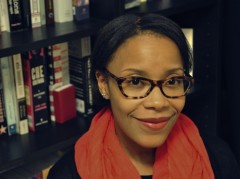 The following is a short excerpt from the article “Decolonization, National Liberation and Revolutionary Internationalism: Candace Sobers, Arthur Kroeger College of Public Affairs” by Mary Giles. The full profile of Prof. Candace Sobers, and the research she is conducting, can be found in the full article online.
The following is a short excerpt from the article “Decolonization, National Liberation and Revolutionary Internationalism: Candace Sobers, Arthur Kroeger College of Public Affairs” by Mary Giles. The full profile of Prof. Candace Sobers, and the research she is conducting, can be found in the full article online.
“How did decolonization, revolution and racial hierarchies influence 20th century international affairs and what were the consequences?” asks Candace Sobers, a professor in Arthur Kroeger College of Public Affairs’ Bachelor of Global and International Studies (BGInS) program. This question has been central to Sobers’s scholarship since graduate studies.
“I’ve always been interested in history, but I did not realize this could be a job until my first year of undergraduate studies at Queen’s University when a history professor suggested that I become an historian.”
“I did an interdisciplinary MSc in the theory and history of international relations at the London School of Economics (LSE). I had planned to study Canadian foreign policy, but due to a scheduling mistake I ended up in the wrong classroom on the first day.
“I found myself in Odd Arne Westad’s seminar on the global Cold War. I have been working in this field ever since. After LSE, I completed my PhD in history at the University of Toronto, with a focus on international history, United States foreign relations and African political history.”
“I came to Carleton in 2015 to help build the new BGInS program,” says Sobers. In BGInS, she teaches global history, global and international theory, and conflict cooperation and change. She is also cross-appointed with the Department of History, the Institute of African Studies and the Institute for Comparative Studies in Literature, Art and Culture.
Sobers specializes in 20th century decolonization, movements of national liberation and the global reach of revolutionary internationalism in developing counties. In her research and teaching, she looks at race, revolution, order and disorder. Her work is interdisciplinary and crosses global boundaries.
Sobers says, “The international system is not a fixed, objective social realm. I see it as a fluid backdrop where elements and characteristics shift over time.”